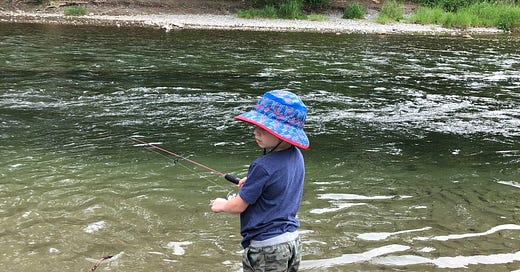When your kid isn't "typical"
I’ve been struggling a lot with all the invisible ways in which we help our youngest navigate the world. The green-eyed monster visits frequently when I look at other families who seem to do every-day things with ease. And yes, I know that what we see isn’t always the whole story–everyone carries their own burdens. Maybe that’s why I am even writing this…for any mother, or parent, who has ever looked at me with my kids and thought the same.
We were blessed with a kiddo who is incredibly sensitive, and attuned to the world. He observes everything around him–like a tuning fork for life’s stimuli–making observations about his environment that less-discerning (or less cautious) eyes easily miss. Understandably this makes the world a lot scarier and overwhelming for him. When everything shines so brightly, it’s easy to feel blind.
What seems innocuous and run-of-the-mill– playdates with friends, for example –takes lead-up and preparation for us. Days even. Working with him to assure, then reassure; make step-by-step plans, then discuss said plans…just to get us to the car! Forget when things change on a dime–the location shifts, the time moves, something expected doesn’t go as planned. We do a lot of calculus in our daily lives. When we go somewhere we think about how many people will be there? Will it be crowded? Will it be loud? Will he need to be near us most of the time? And! When do you push with tough-love, versus allow and accept the anxiety he has? It’s not…simple.
There are many other children who deal with far greater difficulties than my son, and I appreciate where/how our lives are easier in that regard. Perhaps it’s the invisibility of his challenges that leaves a mark on us though. Because his needs are not visible via his body, we find ourselves having to explain a lot.
Before you lob your solutions at us (thanks, we’re good) we’ve tried a lot of stuff. We are in therapy. We work hard at to understand him, to demonstrate our acceptance, and to help him accept himself. The older he gets the more aware he is of his differences, and that sometimes feels heartbreaking. The world isn’t kind to people who don’t fit in. I have hope this is changing. But the only thing I can really do as a parent is to teach him how to love himself, when the rest of the world doesn’t know how.
My ask, I guess, is that when you have a minute, consider the kids that don’t opt-in, or seem overwhelmed at drop-offs, or shy away from the crowd. Because for those kids, and their families, it may have taken a lot of work to get them there.
NOTES
When I speak about “typical”, I mean the fairly oppressive social norms we’ve been conditioned to, based on the heteronormative, white, ableist patriarchal culture we live in. The expectations (implicit or explicit) about how someone (particularly based on their sex) is to behave that permeate our lives.




